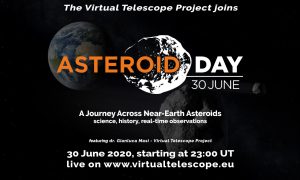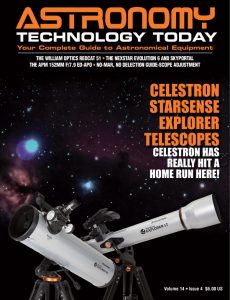Asteroid Day 2020 will be held on June 30 and you’ll have a chance to view online real asteroids by telescope as part of the event.
The Virtual Telescope Project will host “A Journey Across the Near-Earth Asteroids” as part of Asteroid Day 2020. During this event viewers will get to observe live, online and in real-time the most spectacular near-Earth asteroids and their close encounters with the planet. In addition to viewing real near Earth asteroids, viewers will learn what these celestial visitors actually are, their risk of impact and what we can do to mitigate it.
 Asteroid Day 2020 is a continuation of the annual Asteroid Day which is hosted by the Luxembourg based Asteroid Foundation. It its 6th edition, the event presents the public with a snap-shot of cutting-edge asteroid research from the largest telescopes on Earth to some of the most ambitious space missions.
Asteroid Day 2020 is a continuation of the annual Asteroid Day which is hosted by the Luxembourg based Asteroid Foundation. It its 6th edition, the event presents the public with a snap-shot of cutting-edge asteroid research from the largest telescopes on Earth to some of the most ambitious space missions.
In addition to the Virtual Telescope Project live stream, topics of discussion this year include the acceleration in the rate of our asteroid discoveries and why it is set to accelerate even faster, the imminent arrival of samples from asteroid Ryugu and Bennu, the preparations for the joint US-Europe mission to binary asteroid Didymos and much more.
Asteroids are the leftover remnants of the birth of the planets in the Solar System, and many are the shattered fragments of these diminutive proto-planets that never made it to maturity. “Asteroid exploration missions tell us about the birth of our own planet and reveal how asteroids can serve astronauts as stepping stones to Mars,” says Tom Jones, PhD, veteran astronaut and planetary scientist, and Asteroid Day Expert Panel member.
Each asteroid is an individual with its own story to tell. And that’s what Asteroid Day is all about: bringing those stories to the widest audience possible. “Space and science have been an endless source of inspiration for SES! This is one of the reasons why we and our partners continue to do extraordinary things in space to deliver amazing experiences everywhere on earth,” says Ruy Pinto, Chief Technology Officer at SES. “Through satellite broadcasting, we are able to reach millions of TV households and this enables us to unite people around science, space, and technology topics.”
“The valuable expertise of SES and BCE play a central role in making Asteroid Day an international success and enabling us to have a global conversation about space, space resources, and asteroids in these COVID-19 times.” says Mark Serres, the CEO of the Luxembourg Space Agency.
Such studies can also protect our planet. “An asteroid impact is a natural disaster we might be able to avoid if we see one coming soon enough,” says European Space Agency (ESA) Director General Jan Wörner.
Asteroid Day 2020 will include “Asteroid Day LIVE Digital” from Luxembourg which offers a five-hour program with panel discussions including:
- “Target Asteroid: How to Move an Incoming Space Rock”
- “Ingredients of Life: Bringing Asteroid Samples to Earth”
- “Asteroid Safari: Finding the Elusive Space Rocks”
- “Preparing the Future: Making Tools to Investigate Asteroids”
- “Seeing is Believing: The Art of Asteroid Computer Simulations”
- “From Satellites to Asteroids: Luxembourg’s and ESA’s role”
- “Ask Me Anything About Asteroids with Astronauts”
Panel hosts include Sarah Cruddas, Alan Boyle, Lisa Burke, Sabinije von Gaffke, and Stuart Clark. The panel summary descriptions can be found here. Asteroid Day LIVE is streaming over Asteroid Day TV and the detailed program schedule can be found on the Asteroid Day website. After Asteroid Day, the panels can be found there as well as on YouTube.
The European Space Agency will produce several Asteroid Day programs in French, Spanish, Dutch, German, and Italian including asteroid experts and special guests discussing European planetary defense and asteroid-related activities aimed at general audiences in those countries and. ESA will debut an hour-long English segment on 30 June as part of Asteroid Day LIVE Digital from Luxembourg.
In addition to the ESA programs, there are independent online talks taking place worldwide as well. “Stones Fallen From the Sky: The Birth of the Science of Asteroids and Meteorites” will come from Spain, and Asteroid Day Chile has organized for 20+ national institutions to give talks, workshops for children, and audiovisual segments. These will be broadcast on Facebook Live and YouTube simultaneously on 29 & 30 June.
 And to make it easier for you to get the most extensive news, articles and reviews that are only available in the magazine pages of Astronomy Technology Today, we are offering a 1 year subscription for only $6! Or, for an even better deal, we are offering 2 years for only $9. Click here to get these deals which only will be available for a very limited time. You can also check out a free sample issue here.
And to make it easier for you to get the most extensive news, articles and reviews that are only available in the magazine pages of Astronomy Technology Today, we are offering a 1 year subscription for only $6! Or, for an even better deal, we are offering 2 years for only $9. Click here to get these deals which only will be available for a very limited time. You can also check out a free sample issue here.

